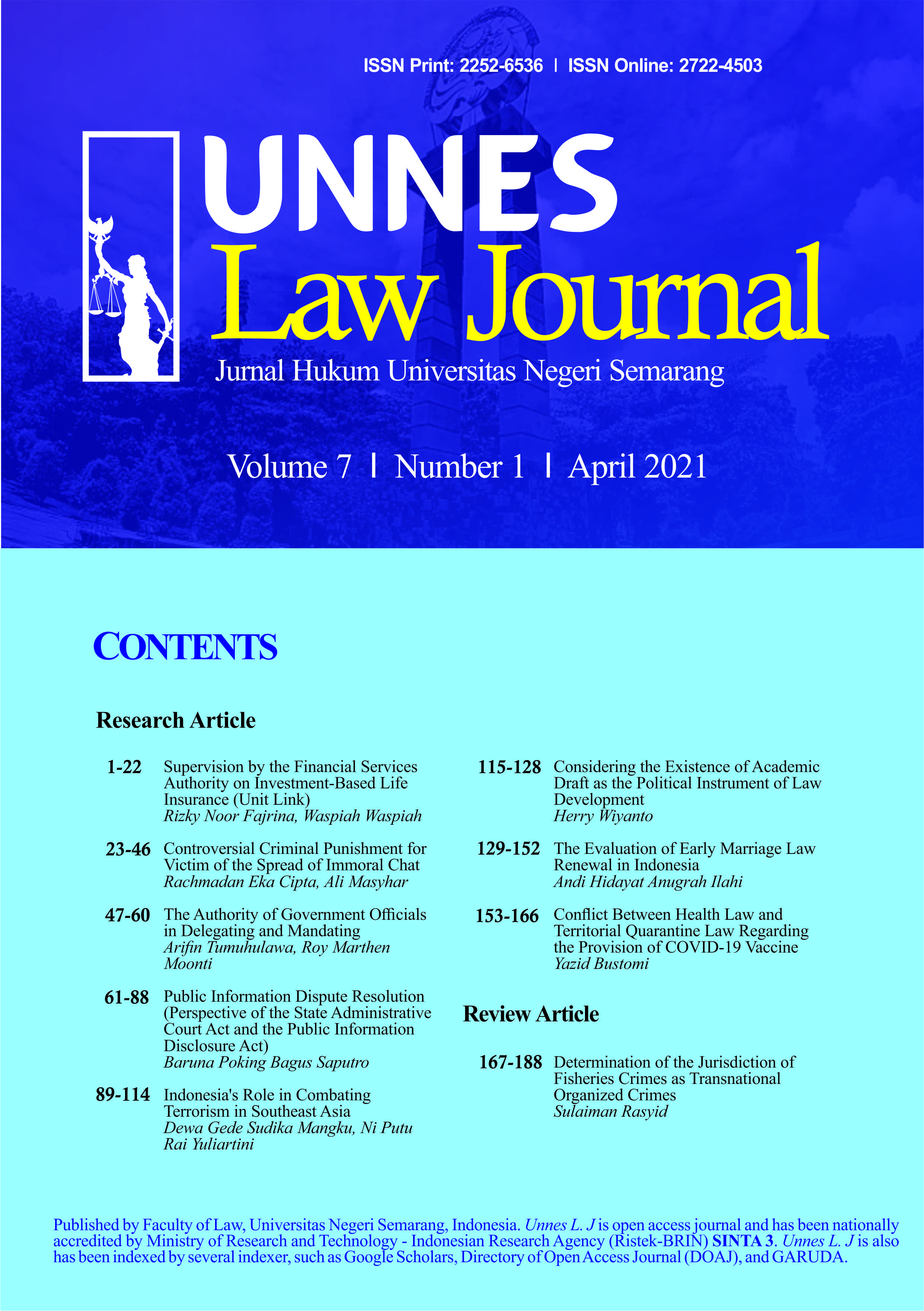Indonesia's Role in Combating Terrorism in Southeast Asia Anti-Terrorism Law, International Law
Main Article Content
Abstract
Terrorism is not a new issue but is an increasingly important issue for ASEAN countries, including Indonesia. Indonesia's involvement in the fight against terrorism is not only to fulfill its obligations as part of the international community to jointly fight terrorism, but also to fulfill its national interests. Indonesia's foreign policy in handling this issue puts forward cooperation with other countries, especially in ASEAN. Where in this study aims to know more about Indonesia's role in combating terrorism in the Southeast Asian region and to better understand the obstacles faced by Indonesia in combating terrorism in the Southeast Asian region. To achieve these objectives, this study uses a type of normative research with descriptive qualitative research methods. The data collection technique was carried out using the library research technique. Where the data comes from books, articles, journals and other documents. The results of the research show that terrorism is a security problem and a cross-border problem so that cooperation between ASEAN countries is needed to eradicate terrorism in Southeast Asia through the ASEAN Convention on Counter Terrorism. Indonesia's role in eradicating terrorism by internal and external efforts carried out bilaterally and multilaterally. Given that terrorism is a transnational crime, in Indonesia's role in eradicating terrorism there are several obstacles and challenges. This challenge relates to the principles of consensus and non-intervention, domestic conflicts as well as differences in commitments and perceptions among ASEAN countries.
Article Details
References
Abdulkadir, M. (2004). Hukum dan Penelitian Hukum. Bandung: Citra Aditya Bakti.
Abuza, Z. (2005). The Moro Islamic Liberation Front at 20: State of the Revolution. Studies in Conflict & Terrorism, 28(6), 453-479.
ADMM. (2017). About the ASEAN Defence Ministers’ Meeting Plus (ADMM-Plus). Diakses dari https://admm.asean.org/index.php/about-admm/about-admm-plus.html, pada tanggal 07 Desember 2020, pukul 13.15 WIB.
Ali, Z. (2013). Metode Penelitian Hukum. Jakarta: Sinar Grafika.
Brookes, G. P. (2010). The multilayered effects and support received by victims of the Bali bombings: A cross cultural study in Indonesia and Australia (Doctoral dissertation, Curtin University).
Djelantik, S. (2013). Poverty, ethnicity and religious factors in the increase of terrorism: a case in Indonesia. Thesis, Bandung: Universitas Parahyangan.
Emmers, R. (2003). ASEAN and the securitization of transnational crime in Southeast Asia. The Pacific Review, 16(3), 419-438.
Emmers, R. (2009). Comprehensive security and resilience in Southeast Asia: ASEAN's approach to terrorism. The Pacific Review, 22(2), 159-177.
Funston, J. (1998). ASEAN: out of its depth?. Contemporary Southeast Asia, 22-37.
Funston, J. (1999). Challenges facing ASEAN in a more complex age. Contemporary Southeast Asia, 205-219.
Gerstl, A. (2010). The depoliticisation and ‘ASEANisation’of counter-terrorism policies in South-East Asia: A weak trigger for a fragmented version of human security. Available at SSRN 1618968.
Hamilton-Hart, N. (2005). Terrorism in Southeast Asia: expert analysis, myopia and fantasy. The Pacific Review, 18(3), 303-325.
Hoffman, B. (2002). Rethinking terrorism and counterterrorism since 9/11. Studies in Conflict and Terrorism, 25(5), 303-316.
Ibrahim, J. (2006). Teori dan Metode Penelitian Hukum Normatif. Malang: Bayumedia.
Independensi. (2019). Anggota ASEAN Perkuat Koordinasi Cegah Radikalisme dan Ekstrimisme. Diakses dari https://independensi.com/2019/08/08/anggota-asean-perkuat-koordinasi-cegah-radikalisme-dan-ekstremisme/, pada tanggal 08 Desember 2020, pukul 15.40 WIB.
Indomaritim. (2020). Kerja Sama ASEAN di Bidang Politik dan Keamanan. Diakses dari https://indomaritim.id/kerja-sama-asean-di-bidang-politik-dan-keamanan/ Kerja Sama ASEAN di Bidang Politik dan Keamanan, pukul 17.45 WIB.
Kanu, I. A., & KANU, C. C. (2018). Africa at the Cross Roads of Violence and Gender Inequality: The Dilemma of Continuity in the Face of Change. AuthorHouse.
Kemlu. (2016). Kerjasama politik keamanan ASEAN, www.kemlu.go.id/.../kerjasama%20politik%20keamanan%20ASEA. Diakses pada tanggal 07 Desember 2020, pukul 18.11 WIB.
Kemlu. (2019). Indonesia dan Upaya Penanggulangan Terorisme. Diakses dari https://kemlu.go.id/portal/i/read/95/halaman_list_lainnya/indonesia-dan-upaya-penanggulangan-terorisme, pada tanggal 06 Desember 2020, pukul 09.19 WIB
Kompas. (2020). Peran Indonesia di Asia Tenggara. Diakses dari https://www.kompas.com/skola/read/2020/01/05/180000369/peran-indonesia-di-asia-tenggara?page=all, pada tanggal 06 Desember 2020, pukul 14.31 WIB.
Marzuki, P. M. (2016). Penelitian Hukum Edisi Revisi. Jakarta: Prenamadia Group.
Nadia, J. (2019). Punya Potensi Besar, Prabowo: ASEAN Tidak Boleh Terpecah Belah, Diakses dari https://www.teropongsenayan.com/107138-punya-potensi-besar-prabowo-asean-tidak-boleh-terpecah-belah, pada tanggal 06 Desember 2020, pukul 17.56 WIB.
Narine, S. (2002). Explaining ASEAN: Regionalism in Southeast Asia. Lynne Rienner Publishers.
Prihatyono, A. (2009). Peran Indonesia Dalam Mewujudkan Asean Security Community Dan Upaya Mengatasi Kendaladalam Pelaksanaan Rencana Aksi. Diakses dari Lontar.ui.ac.id
Purnama, B. E. (2016). Giliran Indonesia Pimpin Pemberantasan Kejahatan Lintas Negara. Diakses dari https://mediaindonesia.com/politik-dan-hukum/42473/giliran-indonesia-pimpin-pemberantasan-kejahatan-lintas-negara, pada tanggal 05 Desember 2020, pukul 13.21 WIB.
Puspanathan, S. (2016). Upaya ASEAN untuk memerangi terorisme. Diakses dari http://www.asean.org/15060.htm, pada tanggal 05 Desember 2020, pukul 16.50 WIB.
Ramakrishna, K. (2004). Terrorism in Southeast Asia: The Ideological and Political Dimensions. Southeast Asian Affairs, 54-60.
Salifu, O. F. (2017). United Nation approaches to global terrorism: a case study of Boko Haram (Master's thesis).
Setnas. (2017). Sekretariat Nasional ASEAN–Indonesia. Diakses dari http://setnas-asean.id/asean-defence-ministers-meeting-admm, pada tanggal 08 Desember 2020, pukul 21.43 WIB.
Sinagar, Y. A. (2017). Peraan Indonesia dalam Mengatasi Terorisme di ASEAN. Diakses dari https://www.google.com/search?client=firefox-b-d&q=peran+indonesias+dalam+mengatasi+terorisme+di+asean, pada tanggal 07 Desember 2020, pukul 17.16 WIB.
Singh, B. (2004). The challenge of militant Islam and terrorism in Indonesia. Australian Journal of International Affairs, 58(1), 47-68.
Soekanto, S., dan Madmuji, S. (2001). Penelitian Hukum Normatif: Suatu Tinjauan Singkat. Jakarta: Rajawali Pers.
Sunggono, B. (2010). Metodologi Penelitian Hukum. Jakarta: PT Grafindo Persada.
Tan, A. T. (Ed.). (2009). A handbook of terrorism and insurgency in Southeast Asia. Edward Elgar Publishing.
Tomotaka, S. (2008). ASEAN Security Community: An initiative for peace and stability. NIDS Security Reports, 3(4), 17-34.
Utari, M. J. (2020). Peran Indonesia dalam ARF. Diakses dari https://www.wartaprima.com/peran-indonesia-dalam-arf, pada tanggal 06 Desember 2020, pukul 13.21 WIB.
Yu, H. (2017). Motivation behind China’s ‘One Belt, One Road Initiatives and establishment of the Asian infrastructure investment bank. Journal of Contemporary China, 26(105), 353-368.
Zhang, J., & Benoit, W. L. (2004). Message strategies of Saudi Arabia’s image restoration campaign after 9/11. Public Relations Review, 30(2), 161-167.
